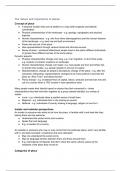Other
AQA A-Level Human Geography | Changing Places
- Institution
- AQA
These are my notes for the Changing Places module of AQA A-Level Geography (7037), particularly Paper 2 - Human Geography. I got an A* across the whole of A-Level AQA Geography, and my main way of revising was reading over these notes frequently, and doing consistent active recall/"blurting" using ...
[Show more]



